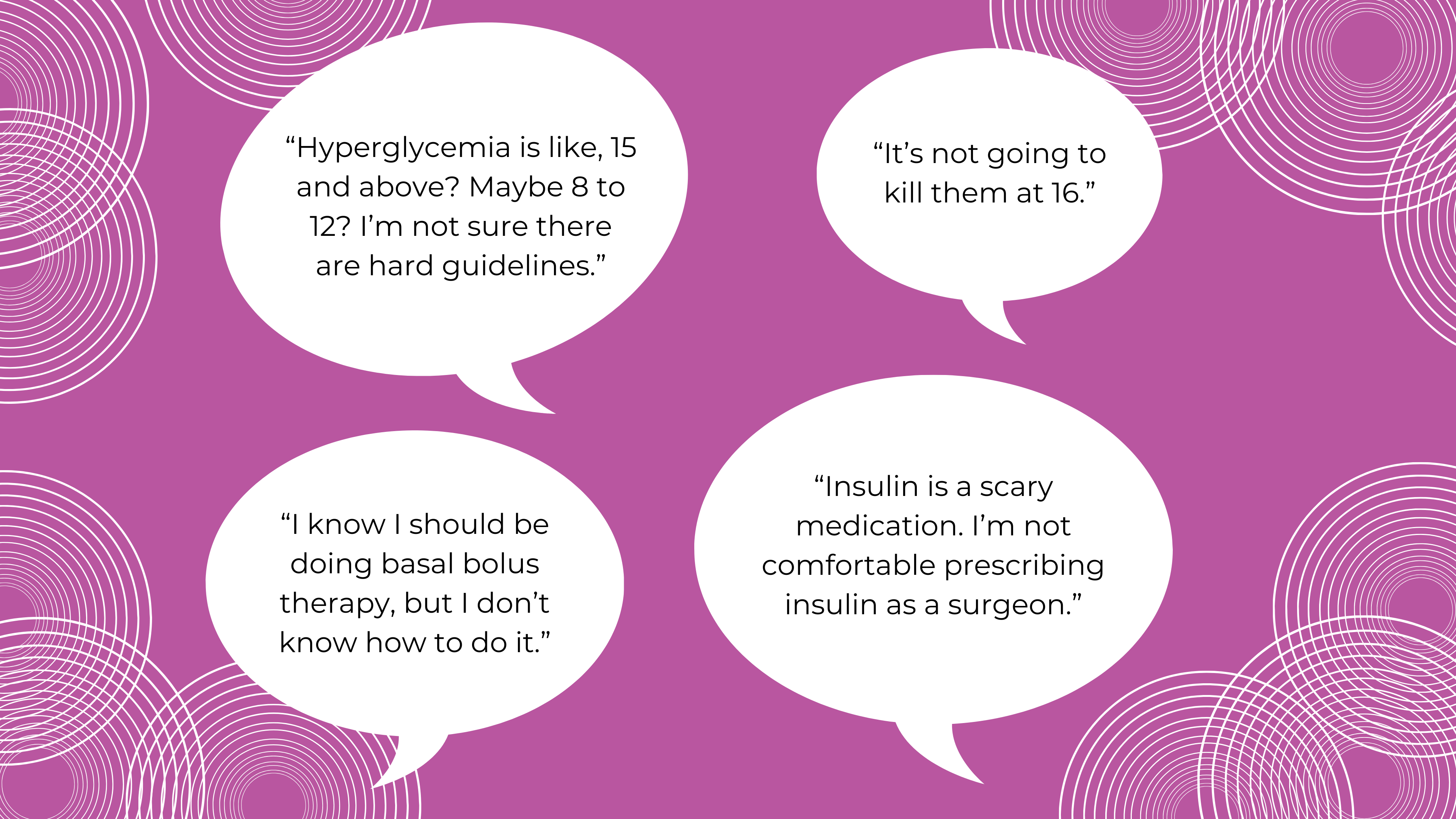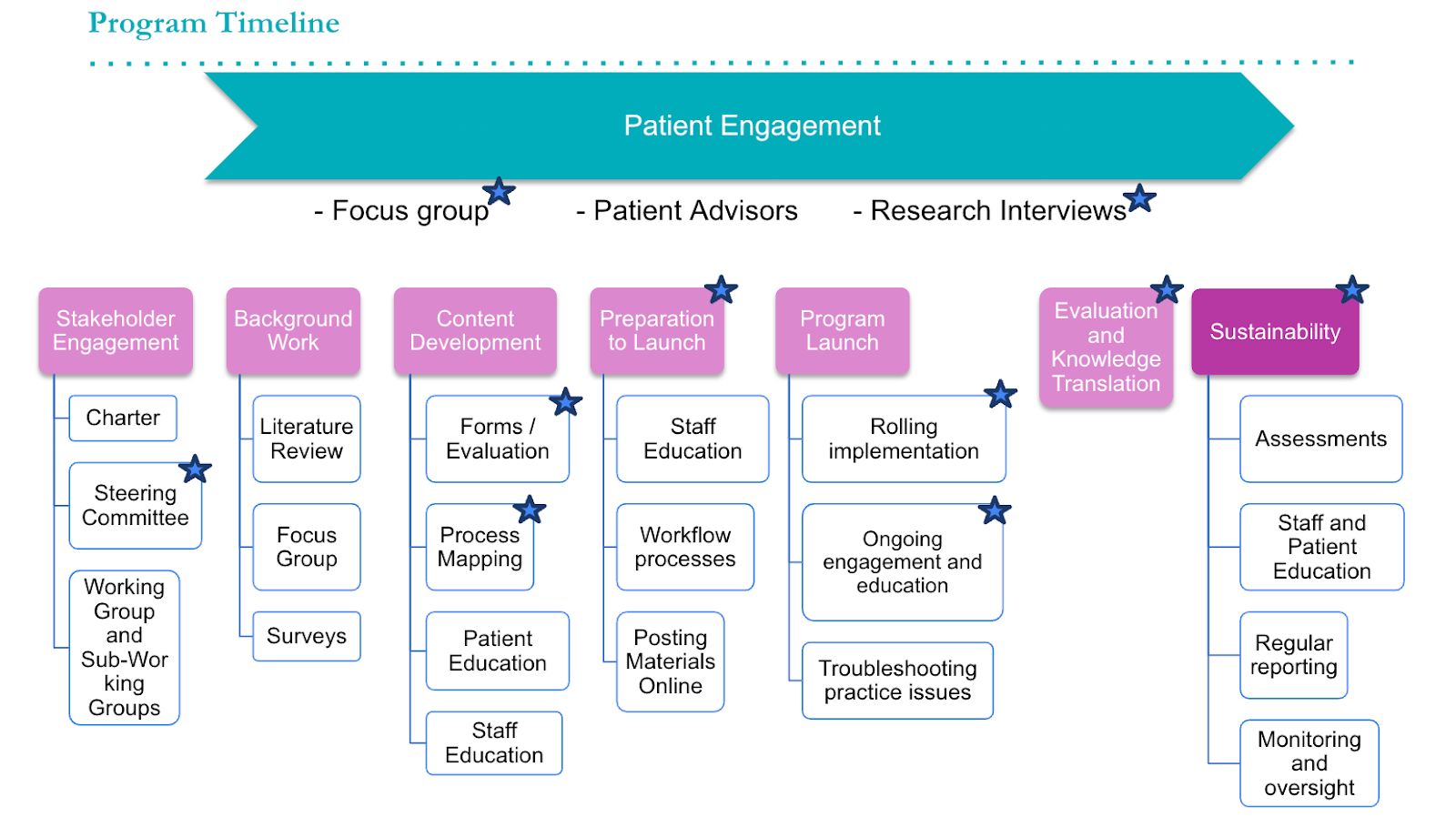Main Menu
Alberta’s health system is strengthening through the integration of implementation science at various stages of health system initiatives. Implementation science is a cornerstone of the Alberta Strategy for Patient-Oriented Research SUPPORT Unit (AbSPORU)’s services, and collaborations between health system partners and AbSPORU have yielded transformative outcomes in patient care and efficiency.
In the below examples, AbSPORU acts as an important partner for Alberta Health Services (AHS) Strategic Clinical Networks (SCN) projects, demonstrating how embedded implementation science at early-, intermediate- and end-stage enable impactful health-system research and drive forward a learning health system.
Optimizing the Management of Staphylococcus Aureus Bacteremia (OPTIMUS-SAB) is an early-stage quality improvement project lead by Andrea Plaiser of AHS’ Medicine SCN, funded through Alberta Innovates Partnership for Research and Innovation in the Health System (PRIHS) program, with implementation and patient engagement support by AbSPORU.
Staph aureus bacteremia (SAB) is a common bacterial infection (~1,875 cases per year in Alberta, and rising) with a high mortality rate (~30% in Alberta) that requires interdisciplinary management. However, there is a significant care pathway gap in Alberta. Currently, a patient’s most responsible physician/practitioner (MRP) may not know the most suitable next step after receiving a positive test notification for a patient. This care gap is heightened by physician-dependent geographic barriers that create variable access to care, especially in rural Alberta.
OPTIMUS-SAB aims to improve the management of SAB across the care continuum by using a digital solution that involves pharmacists as care coordinators. Participating pharmacists would receive a copy of positive lab notifications and provide guidance to the MRP on next steps and quality care indicators, providing more timely and equitable care for Albertans with positive SAB tests.
The OPTIMUS-SAB project involves a complex implementation and evaluation plan. AbSPORU provided early-stage support, including grant writing assistance, development of complex implementation and evaluation plans, assessment of implementation barriers and facilitators, and templates and tools for data collection.
As well, patient-engagement was embedded in the project, with patient advisors included on its working group and steering committee. These advisors co-developed resources to help patients better understand their diagnosis and care next steps. The project will also engage a PaCER* group to conduct patient-led research into the effectiveness of virtual consultations delivered by Infectious Disease experts at acute care sites.
Rollout of the OPTIMUS-SAB initiative began in the Edmonton zone in May 2024, and will be in a new Alberta Zone every three months. AbSPORU continues to provide support to the initiative, including Implementation Theory training, data management, and assistance with coding and analyzing IS data from surveys, interviews, focus groups and barriers/facilitators spreadsheets collected across the project sites.
Plaiser describes AbSPORU’s support as being “pivotal in the project’s successful launch, facilitating effective knowledge translation and implementation science strategies”.
Postoperative hyperglycemia (high blood sugar) occurs in up to 50% of surgical patients nationwide – 20-30% (est) of surgical patients have known diabetes, and 5-10% (est) have undiagnosed diabetes. To determine if these estimates are similar in Alberta, Leta Philip of AHS’ Diabetes, Obesity and Nutrition (DON) SCN, oversees an intermediate-stage project in mid-implementation, focusing on perioperative glycemic management, which is associated with twice as many surgical site infections in Alberta, 6% more cardiac injuries, longer length of stay, 4% more ICU admissions, increased 30-day readmission, and increased 30-day mortality. This project is also funded through PRIHS and is co-sponsored by the DON SCN and the Surgery SCN.
The project team carried out a retrospective analysis in Calgary between 2019-2021, involving 6,600 non-cardiac surgical patients who were admitted to hospital for longer than 24 hours. They found that:
Along with this data, the project team conducted qualitative interviews with 17 surgical team members. The results confirmed a critical gap in the screening, monitoring, and treating of hyperglycemia among surgical patients in Alberta, and in healthcare professionals’ knowledge, beliefs, and behaviours related to perioperative glycemic management.

In response to the findings, the project team prioritized development of a perioperative hyperglycemia care pathway to support practice change, which launched as a pilot in Calgary. The pathway includes pre-surgery screening patients for hyperglycemia risk, personalized management plans, ensuring clear communication among surgical team members, and empowering them to monitor and treat the patient’s hyperglycemia on the day of surgery based on the management plan.
Philp describes that AbSPORU played a vital role in establishing the project’s implementation steering committee and partnership structure, which co-developed tools including an evaluation framework, implementation guide, and barriers and facilitators maps to support the needs of the research team as well as the implementation sites.
The steering committee consisted of experts from all fields, including 7 patient partners who were integral to grant writing and co-developing data collection tools such as patient experience surveys, focus group questions, and a patient experience journal. The project team will also engage a PaCER group for further focus group exploration.
AbSPORU’s ongoing support includes Implementation Science training, feedback, and resources to ensure that an implementation lens is integrated throughout the project. The project team also relies on AbSPORU for data metrics collection, identification and analysis.
The Incremental Dialysis Program is now in its sustainability phase and is lead by Tracy Lynn Wityk Martin of AHS’ Medicine SCN. The program is a collaborative effort with Alberta Kidney Care.
More than 700 patients start chronic hemodialysis every year in AHS facilities; this demand contributes to significant system capacity challenges. Transition to dialysis is associated with high morbidity and mortality, meaning that people are experiencing a significant decrease in quality of life and have an increased chance of dying (especially soon after dialysis initiation).
The goal of the Incremental Dialysis Program was to improve patient outcomes through implementing and evaluating incremental dialysis across Alberta.
Previously, all patients starting hemodialysis received the same prescribed treatment: 3 times a week for 4 hours, regardless of their needs and where they were in their journey. With an incremental approach to dialysis initiation, patients are offered individualized treatment and a gentler and gradual start to dialysis. The initiative involved starting eligible new patients on long-term, in-centre dialysis and gradually increasing from 2 times per week to 3, as indicated. This system greatly improved their quality of life while helping to better manage system capacity.
AbSPORU’s support was critical throughout (figure 1) – Implementation experts were part of the working group and sub-working group, and patient engagement has been integrated throughout the program. Patient partners contributed to steering committees and working groups, and developed a separate patient advisory group. They identified the need for personalized hemodialysis and suggested incremental initiation as a potential solution. They also co-designed the program, education materials, evaluation framework, and provided input on sustainability strategies and advice on knowledge translation tools.

Once launched, AbSPORU continued their support through patient education, troubleshooting, advising on course corrections, and supporting evaluation and knowledge mobilization — everything needed to maintain the program.
Overall, the program has shown significant positive outcomes:
AbSPORU’s embedded implementation science support has been critical in advancing health-system initiatives at various stages. Early-, mid-, and end-stage projects have benefitted from AbSPORU’s services, resources and expertise – ensuring successful implementation and transformative health-system impact through care practice and policy change. Not only is AbSPORU’s support critical during implementation, but also afterwards to ensure sustainability of these changes. Through these partnerships, healthcare outcomes across Alberta are improved through effective implementation science.
At AbSPORU’s 2024 Northwest SPOR Collaborative Forum, project leads Leta, Andrea and Tracy Lynn, along with former SCN Chief Program Officer, Tracy Wasylak presented the highlights of these collaborations. To watch the full presentation click here.
Let us know how you want to stay connected


 News + Events
News + Events

 Patient Partner Research Opportunities
Patient Partner Research Opportunities

 I agree to receive occasional emails from AbSPORU.
I agree to receive occasional emails from AbSPORU.© 2025 AbSPORU